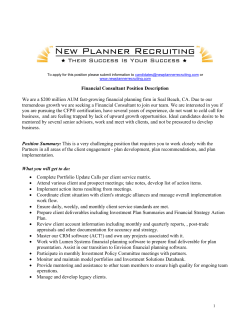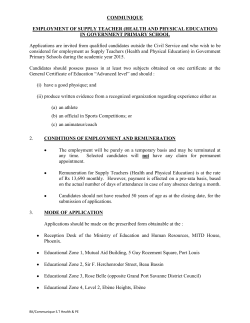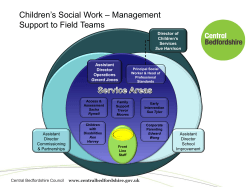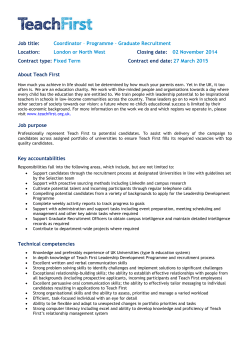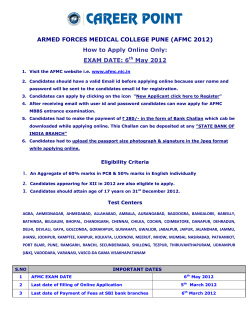
EDUCATION - Rowan University
R O WA N U N I V E R S I T Y ’ S C O L L E G E O F E D U C AT I O N Innovation in EDUCATION FA L L 2 0 1 4 Acce ss , S u cce ss , E q u i t y . . . Tu r n i n g Re s e a rc h I n to P ra c t i ce ECDC reaches new heights Message from the dean R owan University’s Early Childhood Demonstration Center (ECDC) provides quality education for its littlest learners and classroom experience for future teachers. Ever committed to educational excellence, the ECDC continues to pursue ways to better serve both groups. “We’re working to develop a curriculum that’s very progressive,” said Leah Walker, ECDC director. To create a model program, staff evaluated curricula at schools nationwide. As it implements these advances, the ECDC also expanded to include a full-day prekindergarten program and opened its doors to the Glassboro community. Previously, the program was open only to children of Rowan employees, students and alumni. “With the new curriculum changes in Teacher Education, we are hoping to make the preschool program a cohesive and integral part of the Early Childhood Education program,” Walker said. “Our vision is for our early childhood teacher candidates to be able to visualize education in a new light that is beyond traditional teacher-centered curriculum planning,” said Dr. Zeynep Ercan, associate professor of Teacher Education and program coordinator for the Early Childhood Education program. “The ECDC already has been a place for best practices, and our collaboration will strengthen this vision further. “For the demonstration center, our vision is for candidates to understand that it is possible to have a very high quality early childhood education, a vigorous education, that is very academic,” Ercan said. “But it happens through play and long-term child-led projects, a very intentional environment to provoke a sense of wonder, daily reflection and documentation of learning and building relationships and social emotional competencies.” Dr. Zeynep Ercan (left) and Leah Walker engage preschoolers in a fall activity. B uilding upon our rich legacy of excellence in education, we in the College of Education have established a new mission. Our objective is to positively impact and develop local, regional, national and global educational communities by: • Collaborating with partners in the field to promote learning and the mental and physical health of diverse learners in all settings; • Integrating teaching, research and service to advance knowledge in the field; • And preparing and supporting professionals through the development of knowledge, skills and dispositions. In all of these, the ultimate goal is to ensure equitable educational opportunities for all learners. In addition, we’ve developed a tagline — Access, Success and Equity . . . Turning Research Into Practice. This phrase represents our commitment to addressing issues of access and equity by focusing on success. With a new vision, mission and tagline, the College is building the infrastructure to support research, professional development and policy initiatives. Thank you for your support. In service, Dr. Monika W. Shealey Dean Rowan professional development school explores new initiatives S ince receiving a National Association for Professional Development Schools Award in 2103, the Holly Glen Elementary School in Williamstown continues to break new ground. A professional development school (PDS) of Rowan’s College of Education, Holly Glen recently received a grant from the Whole Child Network. The PDS component will prepare Rowan candidates and provide the faculty and staff with ongoing professional development, said Dr. Stacey Leftwich, professor in residence and associate professor in Language, Literacy and Special Education. Teacher candidates take a weekly hour-long undergraduate course at Holly Glen that includes a practicum component. “Candidates use the learning from the course to create lessons they will implement when tutoring a child one-on-one in literacy,” she said. Another major initiative, the What I Need (WIN) program, groups students by their literacy needs. Participating students leave their classrooms for 45 minutes each day to work with a teacher who designs lessons based on their area of difficulty. Based on feedback from the teachers about the new program, the College is creating professional development sessions for faculty to help make this program a success. Holly Glen also offers a full-year internship program for candidates. Those who complete their practicum at the school may apply for its full-year internship the following year. In addition, the College began a collaborative internship model in a first-grade classroom, which includes a mentor teacher and three Rowan interns. “The collaborative internship allows interns to work with small groups of students as well as the entire class,” Leftwich said. “The three interns each take a group of students and work with them in an area of difficulty. The model has provided opportunities for differentiation in order to meet the needs of the children. That’s been exciting to watch.” Teacher candidates (from left) Dana Daly, Amanda Cundiff, Jenna Jernegan and Dr. Stacey Leftwich work with students in the Holly Glen Elementary School. Fellows (from left) Bethany Fowler, Daniel Klehamer, Jeffrey Chiusano, Lesley Tolentino, Drew Favat and Matthew Zachariades collaborate on a STEM activity. Fellowship program trains STEM teachers T he College’s newly established Master of Arts in STEM Education program welcomed its first cohort of Woodrow Wilson New Jersey Teaching Fellows in September. The fellowship program, which includes five New Jersey institutions and is supported by a consortium of New Jersey funders, recruits career changers and recent graduates with strong science, technology, engineering and mathematics (STEM) backgrounds to teach in high-need districts. Each fellow receives reduced tuition and $30,000 to complete the program. After graduation, they are required to teach in high-needs New Jersey schools for three years, when they will continue to be mentored through their tenure year. The six Rowan fellows, who are among the first Woodrow Wilson fellows in the state, will spend a full year in a teaching residency in either the Millville or Vineland school district, earning certifications in either physics or mathematics. “The program is completely STEM-focused,” said Dr. Jill Perry, associate professor of Mathematics Education and coordinator of the M.A. in STEM Education. “Whether they are taking courses related to pedagogy, equity, diversity or learning, every class is taught within a STEM context.” The program also provides fellows with the flexibility to attend special sessions within their districts, such as new-teacher orientation and professional development workshops. The program uniquely prepares fellows to step into the classroom. All of the structures are designed to support the fellows’ development as professionals who are ready to teach. “Before they begin teaching in their own classrooms, the fellows already will have a year’s experience through co-teaching with their mentor teachers,” Perry said. “It’s almost like they’re first-year teachers now — but with time and support to develop their skills with close guidance. That will be of great benefit to them and their future students.” Honor society paves path for counseling students T he Zeta Pi chapter of the Chi Sigma Iota International Counseling Honor Society has left few stones unturned as it seeks ways to help its members prepare for their future students. Members learn firsthand about students’ challenges by participating in programs such as the Creating Higher Aspiration and Motivation Project (CHAMP)/Gear Up workshop series for Camden students in grades 6 through 12. “It provides counseling, mentoring, tutoring, assistance, and career and post-secondary planning,” said chapter president Meghan Setser, M’15, a Jackson resident. “The goal is to motivate students to achieve post-secondary success.” The chapter established a mentoring program last year to support its newest members. “Everyone in the program who is interested is assigned to a mentor in the program, so they start to feel connected and incorporated into the program,” said Dr. Kara Ieva, chapter advisor and assistant professor in the Counseling in Educational Settings program. Furthermore, the chapter provides professional development workshops to prepare candidates for career and college readiness challenges. Members also gain from a strong Zeta Pi network of students and alumni, who share career advice and job leads. “Being able to be a part of Zeta Pi and this program as a whole is really an opportunity to network with students who are going through the same things that you’re going through and people you will be able to count on once you are in the field,” Setser said. Nakia Watts (center) and Samantha Nixon (right) encourage CHAMP/Gear Up participants during a workshop presented by Zeta Pi. One Saturday each month, the chapter presents workshops to CHAMP/ Gear Up participants on time management, stress management, creating smart goals and other topics. Through these experiences, counselor candidates promote career and higher education preparedness. Candidates help students strategize for the future T he complex world of work and college may mystify many K-12 students. But school counselors play a key role in helping them create a map for the future. Traditionally, school counselors focused on academics, social and emotional development, and career and college readiness. “Research has shown that career is the first that tends to go, so we try to fully emphasize this,” said Dr. Kara Ieva, assistant professor, Counseling in Educational Settings. To measure their effectiveness, numerous Rowan counselor candidates perform interventions and follow up with research studies to assess their interventions. Additionally, candidates provide extra support in career and college readiness for middle and high school students through initia- Dr. Zalphia Wilson-Hill, assistant professor, College of Education, Counseling in Educational Settings, listens as Meghan Kilburn responds to a theoretical counseling situation imprinted on the ball. tives such as the Aim High Science and Technology Program. To enhance candidates’ expertise, the College offers career and college readiness workshops, and to close the achievement and access gap, it recently developed a Ph.D. program in school counselor education. Preparing K-12 students for careers and college requires multiple steps, said Dr. Hector Rios, associate professor and program coordinator, Counseling in Educational Settings. Students first need to consider who they are and orient themselves to the world of work. “One of the practices school counselors can do is to open up new vistas for students or talk about new possibilities the student had not considered,” he said. Finally, counselors need to help students establish goals and develop a plan to achieve those goals. “The new thrust of 21stcentury counseling is that programs must be delivered for all students, not to some students,” Rios said. College of Education 201 Mullica Hill Road • Glassboro, NJ 08028 NON-PROFIT ORGANIZATION U.S. POSTAGE PAID BELLMAWR, NJ PERMIT 1047 Rowan University’s PROFtoberfest Homecoming celebration in October gathered faculty, alumni, students and the community. Dr. Monika Shealey (third from right) greeted (from left) Kerryn Hughley, ’16, Ellen Weinhofer-Scavelli, ’87, Kristin Tryon Shaw, ’88, Ethel Davis Jones, ’92, M’02, and Nicole Chermark, ’17. New faculty join college Innovation in EDUCATION Volume 7, Issue I • Fall 2014 Dr. Monika W. Shealey Dean Dr. Lisa Vernon-Dotson Associate Dean Dr. Rihab Saadeddine Assistant Dean Dr. Ann Tiao Assistant Dean Barbara Baals Editor Diane DonofrioWriter/ Angelucci Project Manager Craig Terry Photographer Traci Belli Downing Graphic Designer T his fall, the College welcomed the following new faculty members: • Dr. Stephanie Abraham, assistant professor, Language, Literacy and Special Education, earned her doctorate from the University of Georgia. Her research has focused on how schools help shape society. • Dr. Zeynep Ercan, associate professor, Teacher Education, and program coordinator for the Early Childhood Education program, earned her doctorate from Ohio State University. Her recent research has focused on the education of immigrant children and families, as well as science and technology integration. • Kelley Perkins, assistant professor, Teacher Education, earned her M.S. from the University of Delaware, where she is also a doctoral candidate. Her recent research focuses on state quality improvement and rating systems. Dr. Zeynep Ercan, Dr. Stephanie Abraham, Dr. Trevor Smith, Dr. Anna Sun and Kelley Perkins (left to right) brought their talents to the College this fall. • D r. Trevor Smith, assistant professor, Physics & Astronomy and Teacher Education, earned his doctorate from the University of Maine. He specializes in physics education research. • Dr. Anna Sun, assistant professor, Educational Services and Leadership, earned her doctorate from the State University of New York at Buffalo. Her work focuses on educational leadership and policies, social justice in schools, school changes and reforms, and other issues. Innovation in Education is published twice annually by the College of Education to highlight the achievements of its faculty, staff and students. We welcome comments and suggestions. Send correspondence and inquiries to: College of Education, c/o Editor, Innovation in Education Rowan University 201 Mullica Hill Road Glassboro, NJ 08028-1701 Contact: 856-256-4752 856-256-4918 (fax) education@rowan.edu www.rowan.edu/education Postmaster: Send address changes to: College of Education c/o Editor, Innovation in Education Rowan University 201 Mullica Hill Road Glassboro, NJ 08028-1701
© Copyright 2025



